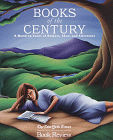
 |
LETTERS
Send us your letters! Locus Online has more room than the magazine for letters. They can be about Locus or the SF field in general. |
August 1999 Letters on this page:
Science-fiction titles selected were Wells' Invisible Man, Brave New World, 1984, A Clockwork Orange, Atwood's The Handmaid's Tale, and Pynchon's Gravity's Rainbow (which is arguably associational (and inarguably tough going [note 1]) , but identified as SF (more or less) in Clute & Nicholl's Encyclopedia of Science Fiction (1995, henceforth EnSF). Two of these six reviews were pans (Invisible Man and Clockwork Orange), and Brave New World is barely recognizable, in the Times review, as the book I recall reading. You will note that all of these books are set in a (then) near-future Earth, and deal largely with the usual concerns of ''mainstream'' fiction. Conspicuous by their absence are all genre-SF authors -- rather surprising in that the Times has (I think) the longest-running SF column of any major newspaper in this country. I'm using the EnSF definition of ''genre SF'' as work ''either labelled as science fiction or instantly recognizable [as such] by its readership.'' EnSF further defines the SF genre as splitting off from mainstream fiction around 1940 in the US, and in the mid 50's in the UK. Thus there isn't much point in labelling, say, Brave New World (1932) as ''genre SF'' (as opposed to mainstream fiction), since the term ''science fiction'' barely existed then. You may have a different opinion of what ''genre SF'' means (and I definitely don't want to get into the ''what is SF?'' definition-game here), but I think most readers will agree that Huxley, Orwell, Burgess, Pynchon and Atwood fall outside the usual canon of ''Greatest Science-fiction Authors of the Century.'' Fantasy works selected by the Times include Burrough's Tarzan (two articles!), Bambi, Charlotte's Web, The Lord of the Rings, The Wind in the Willows, an Anne Rice vampire book, and Watership Down (rabbits). You will note the preference for juveniles and talking-animal fantasies. Tolkien and Rice were the only adult-fantasy authors selected. ''Associated'' books include ''fabulations'' (as defined in EnSF: works that use fantastic elements in distinctly non-genre fashions -- for example, Rushdie's fallen angel Gibreel in The Satanic Verses), ''magic realism'' & such; and F/SF genre authors' non-genre works. I tried not to go too far into the periphery for my ''associated'' group, using EnSF to screen doubtful titles that I haven't read. This is quite a grab-bag, including books by Kafka, Dr. Seuss, Ayn Rand (including a letter from Allen Greenspan(!) defending Atlas Shrugged), Camus, Hubbard's Dianetics (a pan), William Burroughs, Salman Rushdie, Umberto Eco, Primo Levi, Angela Carter, and John Updike. The doubtful calls I included are probably balanced by others (Martin Amis, Don DeLillo, E.L. Doctorow) that I left out. The only SF/F genre authors here are Bradbury (a letter re: W.H. Auden) & Hubbard (about whose fiction the less said, the better). Peter Nicholls (EnSF, ''Mainstream Writers of SF'') rather hopefully writes of a convergence of SF and the mainstream that, he believes, took place in the 1980's. It's pretty clear that, if so, the New York Times hasn't recognised it yet: perhaps 1% of the fiction titles they selected are genre SF or adult fantasy. More positively, 15% or so of the authors selected have used elements of the fantastic in their Books of the Century. So one might conclude that the Times Book Review recognizes the merit of fantastic fiction, but only (sigh) if it isn't labelled as such.
__________
--P.D. Tillman
Dear Locus,
John Ordover |
|||||||||||||
| TOP |
| © 1999 by Locus Publications. All rights reserved. |
